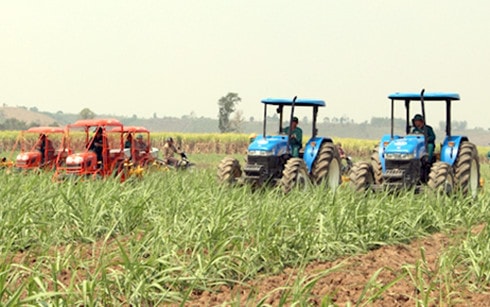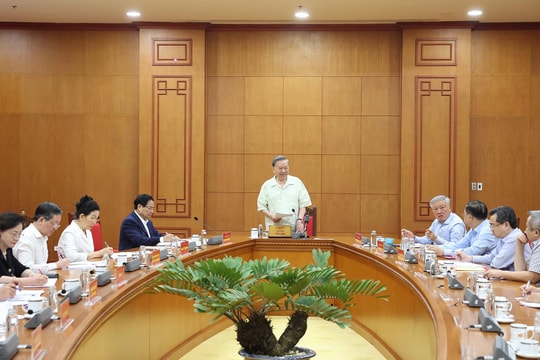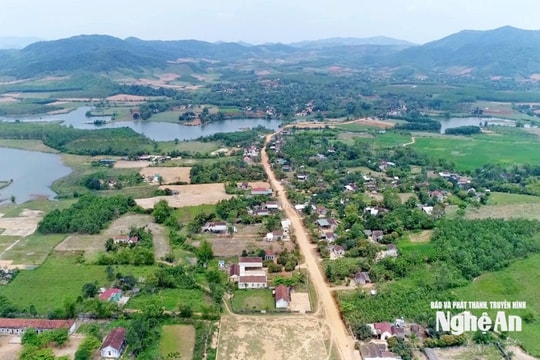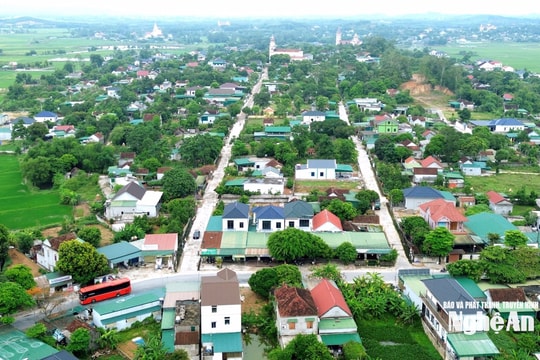Need to make breakthroughs in investment attraction policies to prevent agriculture from… declining
Despite its great potential, investment in Vietnamese agriculture is still limited, so growth is declining...
At the Forum "Promoting the role of enterprises in new rural areas" recently held, Mr. Nguyen Van Binh, Politburo member, Head of the Central Economic Commission, emphasized that Vietnam's agriculture is developing unsustainably and is currently facing difficult economic problems, namely: low added value, unsafe food safety and low profitability of small-scale household production.
Weak investment, declining agriculture
Regarding the current state of Vietnam's agriculture, Mr. Nguyen Van Binh assessed: Vietnam is a country with many advantages in agricultural development. In fact, Vietnam, from a food importing country, has now not only met the food needs of more than 90 million people, ensuring food security and nutritional security; many of Vietnam's agricultural export products have also achieved high rankings in the world such as rice, coffee, rubber, pepper, cashew nuts, tra fish, shrimp, processed wood products, etc.
 |
| Increasing investment attraction in agriculture is a difficult problem to solve (Illustration: KT) |
However, according to Mr. Nguyen Van Binh, Vietnam's agricultural growth and development in the past few decades has been mainly based on the intensive use of production inputs, human resources and natural resources. Notably, since 1990, the rate of productivity growth has slowed down and is slower than most countries at the same level of development in the region because the profits from intensive land cultivation have reached a critical level.
Citing an example, the Head of the Central Economic Commission said that the average growth in agricultural labor productivity in Vietnam during the 2000-2013 period was only 3.4%, less than 50% of that in South Korea during the 1980-1995 period, or China during the same period (7.5%). Furthermore, in 2014, agricultural labor productivity was only 39% of the overall labor productivity of the economy.
One of the important reasons for the above limitations and weaknesses, according to Mr. Binh, is that the agricultural production method in our country is mainly based on small-scale, fragmented household production; enterprises and cooperatives are slow to develop; agricultural production and business lack linkages. In particular, although our country has policies to encourage enterprises to invest in agriculture, the development of agricultural enterprises is still very slow (in 2014, the number of agricultural enterprises accounted for less than 1% of enterprises).
Besides, the mobilization of non-budgetary resources for rural agricultural development is not commensurate, social investment in agriculture and rural areas accounts for a low proportion, about 5.4 - 5.6% of total investment nationwide, and investment by domestic private enterprises is still low.
Minister of Agriculture and Rural Development Nguyen Xuan Cuong also added that the reason is that investment attraction in agriculture and rural areas in recent times has been very limited and not commensurate with the potential and development needs of the agricultural sector. Investment from domestic private enterprises is still low and unstable; the number of agricultural, forestry and fishery enterprises is still small and has tended to decrease recently.
Economic expert Vo Tri Thanh said that despite the great potential, investment attraction in agriculture is still low because agricultural production is highly risky, the elasticity of agricultural product consumption is very low; agricultural insurance has been implemented but is not really effective; the linkage model is implemented, but businesses in the chain do not cooperate with each other, and the contracts between businesses and farmers are still not strong.
Need to make policy breakthroughs, avoid relying on the State
Agricultural exports account for 1/3 of the country's export turnover, but in recent years, the achievements of the agricultural sector have mainly come from household economies. This model has also revealed many shortcomings, mainly producing raw products with low added value. Meanwhile, attracting investment in agriculture is still very limited.
Obviously, the household economy has developed to its limit. The driving force of agricultural restructuring today must be enterprises. The requirement of the agricultural sector in the context of deep international economic integration today is to be linked to the market, improve food safety and hygiene, sustainable production, and chain production. To do this, no one else but enterprises must participate.
However, in Vietnam, for a long time, business forces still believe that investing in agriculture has a high probability of risk due to its dependence on nature, large investment capital and slow capital recovery. For that reason, they do not want to risk investing in this field but mainly participate in investment channels that bring high profits and quick capital recovery (stocks, real estate, services ...).
So how to attract investment in agriculture? To attract businesses to invest in agriculture, many experts suggest that the State needs to have policy breakthroughs, needs to eliminate the mindset of asking and giving, especially avoiding relying on State support. The view of the Vietnam Farmers' Association is that there should be incentive mechanisms that are attractive enough to attract many businesses to invest in the agricultural and rural sectors. This is an important factor in reorganizing production, linking production, contributing to sustainable agricultural development and building new rural areas.
In particular, “applying high technology to agricultural production is one of the solutions to change the backward agricultural picture and old thinking. To successfully implement this model, land resources and people's support are extremely important factors. If there is support from farmers, and solidarity with the government and businesses, then breakthrough projects will be successful.
In fact, any agricultural policy will only be successful when millions of farming households and the business community join hands with the State. The role and responsibility of the Vietnam Farmers' Union through propaganda and mobilization work to raise farmers' awareness of the role and impact of businesses in developing agricultural production and improving farmers' lives is extremely important and necessary" - the Vietnam Farmers' Union affirmed.
The research team of the Institute of Policy and Strategy for Agricultural and Rural Development believes that, in order to promote the application of science and technology in agriculture, there needs to be fundamental policy innovations such as: Promoting the environment for research and application of agricultural science and technology; Encouraging businesses to research and apply science and technology in agriculture; Innovating the agricultural extension system to improve the effectiveness of training, coaching, and transferring technical advances to farmers, etc.
According to VOV



.jpg)

.jpeg)


